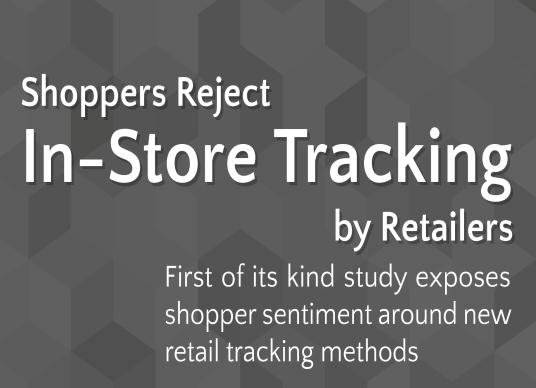
A research conducted by US-based provider of business intelligence and customer feedback solutions OpinionLab reveals that 8 out of 10 shoppers do not want stores to track their movements via smartphones.
The study finds that consumers overwhelmingly do not want to be tracked via cellphone without explicit consent – and they expect to receive something concrete, such as a discount or free product, in return for their participation.
Data security (68.5%) and spying (67%) are top concerns cited by consumers around cellphone tracking in stores. Nearly half (43%) of shoppers are less likely to shop at a favourite retailer if the brand implements a tracking program.
The bottom line is trust: consumers report that they do not trust retailers to keep their data private and secure and they don’t trust that brands will use data to benefit shoppers (versus their own business).
The study, conducted in March 2014, is based on feedback from 1,042 consumers. Key findings include:
· Consumers say no to cellphone tracking: According to the study, 8 out of 10 consumers find it unacceptable to be tracked via smartphone in the store. These are firm no’s – nearly all (88%) of those who disapprove of tracking remain unswayed by retailers’ promises to use tracking data to improve the customer experience. The biggest concerns are that retailers will not keep the data secure (68.5%); tracking feels like spying (67%); and retailers will use the data exclusively to their own benefit (60.5%).
· Consumers do not trust retailers: A vast majority of shoppers (81%) do not trust retailers to keep data private and secure. Surprisingly, shoppers are most likely to trust local stores (15%) with shopper tracking data. Consumers are also twice as likely to trust upscale brands (10%) with data when compared to mass-market retailers (4%) – although trust is dramatically low for both.
· Millennials share suspicion about new practice: While studies show that Millennials are more comfortable sharing personal data with brands online, this does not appear to translate to in-store tracking. Millennials are aligned with other generations when it comes to the acceptability of tracking smartphones (77% say it is not acceptable) and even more distrusting of retailers’ ability to keep data private and secure (76% do not trust retailers to keep data private and secure).
· Consumers want to choose: Opt-in consent (where a consumer actively chooses to participate in a tracking program) is vital to consumers. When asked about the best way for retailers to approach in-store tracking, 64% of consumers said that the best approach is opt-in versus a mere 12% who stated that shoppers should be automatically tracked. When it comes time to participate, though, consumers get cold feet. A full 63% report that they would not opt-in to be tracked – even at their favourite retail stores.
· Risky business: Retailers are rolling the dice when it comes to rolling out in-store tracking and sales. The study found that 44% of consumers say a tracking program would make them less likely to shop with the brand. A comparable number (48%) say it would have no impact, and only 8% stated it would make them more likely to shop at the at store in the future.
· Show me the money: Consumers turned to their pocketbooks when asked what incentives would encourage them to participate in a tracking program. Across the board, consumers expect to be directly compensated for their participation, either by receiving cost saving and price discounts (61%) or by getting free products (53%).
“Consumer sentiment shows that retailers need to tread lightly when it comes to tracking shoppers on their mobile devices. There is a ton of suspicion around in-store tracking, but if it has to happen, opt-in with explicit consent is the strongly preferred way. Retailers also have to acknowledge the ongoing fallout from recent data breaches, and really up the game on privacy and security. The good news is that there is an opportunity for brands who are transparent about collecting data, use an opt-in approach and close the loop by showing consumers that these programs translate into something they value,” says Jonathan Levitt, CMO of OpinionLab.